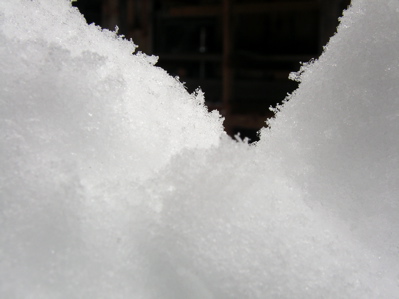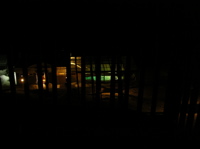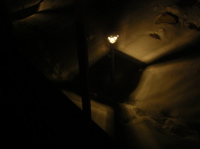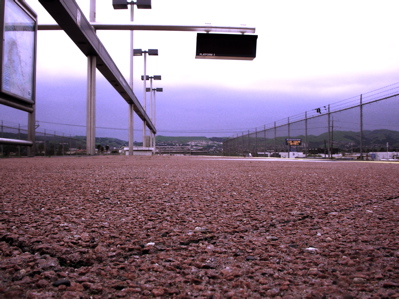16 March 2005 to 16 February 2005
0. We do not act. There is nothing.
1. Or we act, but that is all. There is the fact of the thing that we do, and nothing more. No attention, to intent, no content, no life.
2. When we are better, we try to act well. There is the fact of the thing that we do, and then there is the way in which we do it. There is attention, at least, but the lack of inattention is not enough. Attention is not purpose, not message, not inspiration.
3. When we are better still, we act for a reason. There is what we do, and how we do it, and why. There is something we hope to accomplish, and a method in which we think it can be done, and then the things we do to see if we are right. But the lack of purposelessness is not enough, either. Purpose is not content, not spirit.
4. When we are nearly ourselves, our actions are also ideas. We act not only in service of a particular goal, but of a story in which our purposes are explained. Our actions describe a way in which the world might be different. That is almost enough.
5. And when we are completely ourselves, what we do originates from a spark inside of us. The story is the expression of a divinity, and the purpose serves a story we not only write but believe, and our diligence is thus spiritual instead of mechanical, and our actions are worthy of our moments and our breath.
5. Every fully human action begins in Anima. Every action, from the epic to the occupational, should be founded in the immanence of self. Morality is the steadfast refusal to allow ourselves to inhabit only part of our nature. Whatever you do, do it as if you are you, as if you will be accountable to yourself for every moment of this life, forever.
4. Art is the expression of Anima. Everything you do should express something you believe. There is no empty action, there are only the actions that tell the stories we mean, and the actions that tell stories we didn't consider. Consider your stories.
3. Design is the method of Art, of how we span the difference between the world without our Art and the world that is touched by it. We must understand the context into which we act, and know how we hope to change it. This is neither abstract nor optional, and is part of the conception, not the implementation. Understand before you plan, and plan before you act.
2. Craft is the unfolding of Design. We carry ourselves into stories and plans, and then into work that is ennobled by us, and ennobles us. We act to change the world, and the world is important and deserves our care. These are the words of the story we hope to tell about how we could be. Let your smallest details evoke the grandest revelation.
1. Production is the translation of Craft into patience. In the end, there is always what is done. There is waiting, and repetition, and correction, and walking across rooms and writing down numbers, and starting over. Know what your work requires, and refuse to resent it.
0. And here is the most critical and pressing permanent truth of the appearance of good and evil in daily human effort: It is impossible to assemble this moral structure of action in reverse. You cannot, no matter how sorely and casually and frequently you are tempted, start with Production. It is pointless to demand that unmotivated actions be informed by Craft, inane to attempt to interpolate Design into unsolicited diligence, idiotic to hope to derive Art from undirected intents, and profoundly offensive to try to stipulate something in which to believe. Every fully human action begins in Anima, and evolves in these irreducible stages. Not only is there no shorter way, there is no other way at all. To act otherwise is destruction. To act otherwise is to consume moments and breath and return inevitably to nothing, bringing the world with you.
1. Or we act, but that is all. There is the fact of the thing that we do, and nothing more. No attention, to intent, no content, no life.
2. When we are better, we try to act well. There is the fact of the thing that we do, and then there is the way in which we do it. There is attention, at least, but the lack of inattention is not enough. Attention is not purpose, not message, not inspiration.
3. When we are better still, we act for a reason. There is what we do, and how we do it, and why. There is something we hope to accomplish, and a method in which we think it can be done, and then the things we do to see if we are right. But the lack of purposelessness is not enough, either. Purpose is not content, not spirit.
4. When we are nearly ourselves, our actions are also ideas. We act not only in service of a particular goal, but of a story in which our purposes are explained. Our actions describe a way in which the world might be different. That is almost enough.
5. And when we are completely ourselves, what we do originates from a spark inside of us. The story is the expression of a divinity, and the purpose serves a story we not only write but believe, and our diligence is thus spiritual instead of mechanical, and our actions are worthy of our moments and our breath.
5. Every fully human action begins in Anima. Every action, from the epic to the occupational, should be founded in the immanence of self. Morality is the steadfast refusal to allow ourselves to inhabit only part of our nature. Whatever you do, do it as if you are you, as if you will be accountable to yourself for every moment of this life, forever.
4. Art is the expression of Anima. Everything you do should express something you believe. There is no empty action, there are only the actions that tell the stories we mean, and the actions that tell stories we didn't consider. Consider your stories.
3. Design is the method of Art, of how we span the difference between the world without our Art and the world that is touched by it. We must understand the context into which we act, and know how we hope to change it. This is neither abstract nor optional, and is part of the conception, not the implementation. Understand before you plan, and plan before you act.
2. Craft is the unfolding of Design. We carry ourselves into stories and plans, and then into work that is ennobled by us, and ennobles us. We act to change the world, and the world is important and deserves our care. These are the words of the story we hope to tell about how we could be. Let your smallest details evoke the grandest revelation.
1. Production is the translation of Craft into patience. In the end, there is always what is done. There is waiting, and repetition, and correction, and walking across rooms and writing down numbers, and starting over. Know what your work requires, and refuse to resent it.
0. And here is the most critical and pressing permanent truth of the appearance of good and evil in daily human effort: It is impossible to assemble this moral structure of action in reverse. You cannot, no matter how sorely and casually and frequently you are tempted, start with Production. It is pointless to demand that unmotivated actions be informed by Craft, inane to attempt to interpolate Design into unsolicited diligence, idiotic to hope to derive Art from undirected intents, and profoundly offensive to try to stipulate something in which to believe. Every fully human action begins in Anima, and evolves in these irreducible stages. Not only is there no shorter way, there is no other way at all. To act otherwise is destruction. To act otherwise is to consume moments and breath and return inevitably to nothing, bringing the world with you.
¶ the last ten hours · 9 March 2005
Just because I can, here's the last ten hours of music iTunes has played me.
| # | Artist | Song | Time |
| 1 | Garnet Crow | 忘れ咲き | 4:58 |
| 2 | スピッツ | ほのほ | 4:18 |
| 3 | Feel So Bad | KALLO-KALLO-KALLO | 3:39 |
| 4 | Trans Am | Outmoder | 3:42 |
| 5 | Miller, Scott | Fairest of the Seasons | 3:38 |
| 6 | Zeppet Store | エヴリィ | 4:36 |
| 7 | Darling, Julia | Blue | 4:03 |
| 8 | Feel So Bad | 今日はクリスマス | 3:20 |
| 9 | Breeders | Cannonball | 3:33 |
| 10 | Stretch Princess | Angels | 5:00 |
| 11 | Whitley, Chris | Cool Wooden Crosses | 2:44 |
| 12 | Amos, Tori | Concertina | 3:56 |
| 13 | Amos, Tori | Lust | 3:53 |
| 14 | Feel So Bad | ENDORPHINE | 4:00 |
| 15 | My Bloody Valentine | Nothing Much To Lose | 3:17 |
| 16 | Production Club | Man on the Scene (feat. the Incredible Moses Leroy) | 3:30 |
| 17 | Runrig | Day Of Days | 3:37 |
| 18 | Fake? | Drip | 4:56 |
| 19 | Feel So Bad | 愛しているのに | 3:42 |
| 20 | HIM | Love You Like I Do | 5:14 |
| 21 | Siam Shade | 1/3 の純情な感情 | 3:44 |
| 22 | Suran Song in Stag | No Don't Stop | 3:52 |
| 23 | Siam Shade | アドレナリン | 4:28 |
| 24 | Amos, Tori | Cloud on My Tongue | 4:43 |
| 25 | Field Mice | Clearer | 3:54 |
| 26 | Fredriksson, Marie | Vidare igen | 3:28 |
| 27 | Moore, Abra | I Win | 4:22 |
| 28 | Garnet Crow | 夕月夜 | 4:15 |
| 29 | Sarge | Stall (Live) | 3:26 |
| 30 | New Pornographers | Chump Change | 4:18 |
| 31 | Amos, Tori | Cruel | 4:07 |
| 32 | Utada Hikaru | Animato | 4:31 |
| 33 | Fiona | In My Blood | 4:09 |
| 34 | Gackt | Lust for blood | 5:11 |
| 35 | Feel So Bad | グレチャウゾ | 4:56 |
| 36 | Radiohead | A Wolf At The Door -It Girl, Rag Doll- | 3:21 |
| 37 | HIM | Rebel Yell (Live) | 5:13 |
| 38 | 元ちとせ | 凛とする -strings version- | 4:51 |
| 39 | Glay | アイ | 3:56 |
| 40 | Do As Infinity | 菜ノ花畑 | 3:36 |
| 41 | Feel So Bad | 今夜はおしゃれをして | 3:59 |
| 42 | BUMP OF CHICKEN | 夢の飼い主 | 4:49 |
| 43 | Douglas Fir | At the Hotel | 2:59 |
| 44 | Leo, Ted / Pharmacists | The One Who Got Us Out | 3:04 |
| 45 | Low | I Started A Joke | 4:28 |
| 46 | Twigs | Slumber | 2:44 |
| 47 | Feel So Bad | Deeper | 2:42 |
| 48 | Feel So Bad | オーブントースター | 3:17 |
| 49 | 矢井田瞳 | 明日からの手紙 | 4:50 |
| 50 | Frames | Sickbeds | 4:12 |
| 51 | Corrs | Summer Sunshine | 2:53 |
| 52 | pillows | Plastic Flower | 4:11 |
| 53 | Big Country | Perfect World | 3:16 |
| 54 | brilliant green | Wishing You | 3:02 |
| 55 | Supercar | Love Forever | 4:11 |
| 56 | Ladysmith Black Mambazo | Wangibambezela | 4:59 |
| 57 | Martin, Charlotte | Parade On | 4:15 |
| 58 | HIM | In Joy And Sorrow | 3:35 |
| 59 | Siam Shade | Love Vampire | 4:39 |
| 60 | Sarge | Detroit Star-Lite | 3:33 |
| 61 | Feel So Bad | 今日は今日、気ままに | 3:00 |
| 62 | Mandalay | You Forget | 5:04 |
| 63 | Sarge | Dear Josie, Love Robyn | 3:01 |
| 64 | Primitons | City People | 3:32 |
| 65 | Amos, Tori | Parasol | 3:54 |
| 66 | Amos, Tori | Sweet The Sting | 4:16 |
| 67 | Amos, Tori | The Power of Orange Knickers | 3:36 |
| 68 | Amos, Tori | Jamaica Inn | 4:03 |
| 69 | Amos, Tori | Barons of Suburbia | 5:21 |
| 70 | Amos, Tori | Sleeps with Butterflies | 3:36 |
| 71 | Amos, Tori | General Joy | 4:13 |
| 72 | Amos, Tori | Mother Revolution | 3:58 |
| 73 | Amos, Tori | Ribbons Undone | 4:30 |
| 74 | Amos, Tori | Cars and Guitars | 3:45 |
| 75 | Amos, Tori | Witness | 6:06 |
| 76 | Amos, Tori | Original Sinsuality | 2:02 |
| 77 | Amos, Tori | Ireland | 3:49 |
| 78 | Amos, Tori | The Beekeeper | 6:50 |
| 79 | Amos, Tori | Martha's Foolish Ginger | 4:22 |
| 80 | Amos, Tori | Hoochie Woman | 2:34 |
| 81 | Amos, Tori | Goodbye Pisces | 3:36 |
| 82 | Amos, Tori | Marys of the Sea | 5:11 |
| 83 | Amos, Tori | Toast | 3:42 |
| 84 | New Model Army | Brother | 5:58 |
| 85 | New Model Army | Higher Wall | 4:22 |
| 86 | New Model Army | Flying Through the Smoke | 3:13 |
| 87 | New Model Army | You Weren't There | 3:36 |
| 88 | New Model Army | Orange Tree Roads | 3:56 |
| 89 | New Model Army | Someone Like Jesus | 6:36 |
| 90 | New Model Army | Stranger | 3:35 |
| 91 | New Model Army | R&R | 3:37 |
| 92 | New Model Army | Snelsmore Wood | 4:14 |
| 93 | New Model Army | Paekakariki Beach | 4:43 |
| 94 | New Model Army | Christian Militia | 3:25 |
| 95 | New Model Army | Notice Me | 2:38 |
| 96 | New Model Army | Smalltown England | 3:21 |
| 97 | New Model Army | Vengeance | 4:06 |
| 98 | Ida | Laurel Blues | 4:50 |
| 99 | Ida | 599 | 5:29 |
| 100 | Ida | Late Blues | 5:24 |
| 101 | Ida | Mine | 5:31 |
| 102 | Ida | What Can I Do | 2:57 |
| 103 | Ida | The Details | 4:38 |
| 104 | Ida | Sundown | 6:42 |
| 105 | Ida | Written On My Face | 3:50 |
| 106 | Ida | The Morning | 7:30 |
| 107 | Ida | Forgive | 7:31 |
| 108 | Garnet Crow | 夏の幻 | 3:55 |
| 109 | Tullycraft | Wild Bikini | 2:34 |
| 110 | Trembling Blue Stars | Helen Reddy | 4:25 |
| 111 | Springfield, Rick | Hole In My Heart | 3:12 |
| 112 | September When | When I Drive | 2:18 |
| 113 | Lucksmiths | Moving | 2:51 |
| 114 | Lucksmiths | Transportine | 4:11 |
| 115 | Frames | Revelate | 4:33 |
| 116 | Zeppet Store | INNOCENCE | 3:55 |
| 117 | HIM | Wicked Game (666-Remix) | 3:54 |
| 118 | Amos, Tori | Hey Jupiter | 5:11 |
| 119 | Manic Street Preachers | Solitude Sometimes Is | 3:21 |
| 120 | Siam Shade | 素顔のままで | 4:26 |
| 121 | mcdonald, glenn | Confetti Beams | 3:03 |
| 122 | Keene, Tommy | Disarray | 3:07 |
| 123 | Aberdeen | Emma's House | 3:56 |
| 124 | New Pornographers | The Laws Have Changed | 3:26 |
| 125 | Into Eternity | Beginning Of The End | 4:39 |
| 126 | スピッツ | みそか | 4:37 |
| 127 | Utada Hikaru | Exdous '04 | 4:32 |
| 128 | Frames | Fake | 3:59 |
| 129 | Manda and the Marbles | Upside Down | 3:18 |
| 130 | Low | California | 3:23 |
| 131 | Blue Nile | I Love This Life | 4:04 |
| 132 | Manic Street Preachers | No Jubilees | 3:44 |
| 133 | Wedding Present | Ringway to SEATAC | 2:43 |
| 134 | Ida | Honeyslide | 3:37 |
| 135 | Gackt | 精一杯のサヨナラ | 4:44 |
| 136 | Gackt | Tea Cup | 5:28 |
| 137 | Gackt | Etude | 6:24 |
| 138 | Gackt | ありったけの愛で〜Llv〜 | 5:36 |
| 139 | Gackt | ピース | 4:12 |
| 140 | Gackt | この夜が終わる前に | 4:58 |
| 141 | Gackt | 君に逢いたくて | 5:33 |
| 142 | Gackt | Dears〜LLV〜 | 6:58 |
| 143 | Gackt | サクラソウ | 2:42 |
| 144 | Gackt | Love Letter | 4:55 |
Spitz: Misoka (3.2M mp3)
This week this seems like the quintessential rock song to me. And it's only more quintessential if you don't speak the language.
This week this seems like the quintessential rock song to me. And it's only more quintessential if you don't speak the language.
¶ 8 March 2005
If nothing occurs to you, open the tiniest window to somewhere else.
¶ A Prayer for the Remain · 25 February 2005 fiction/poem
Stochastic in our causes, patriots in a republic of disingenuity, discarders of our angels, prophets of the silently unwound, we cede imbalance to inertia and the slow wind to the quickening hours. Give us reticence to the measure of our tolled waiting, and open ways that we may be escaped by the enchantments we helped tether. And we kneel in parted seas, shelter us with black clouds and the sinuous disenfranchisement of sand. When we stray from the islands of your tenuous grace, lead us to half-hatched disarray and limn our scars in the exhalations of convulsive repose. Give us panic for wakefulness, and tiny hatreds for eyes. Place our souls in the thick throats of lost doves, and our doubts in the deepest vaults of your sightless candor. Lead us to webs of dread and the shut exits of last year's mice, and let their thinset tremors smooth us as we diminish. We are the unmoved and the yet to know; we are the hollows of the bled and the disintegrated confidence of our practice. We are always here, and we are nowhere found.
So we are undone.
So we are undone.
I periodically find myself with small amounts of tabular data that I want to share, and hand-building HTML tables each time is tedious in repetition and awkward to instrument. I have finally amused myself by writing a simple server-side perl script that renders data from a csv file into an HTML table, and you are welcome to it if you have similar needs.
¶ 16 February 2005
1. This terrible town in which my employer is sub-headquartered has the tedious contours of a Sim City game played with dogged consistency in place of any shred of imagination. Numbingly uniform tiles snap together with cultivatedly anonymous diligence. The streets have individual names, but absolute characterlessness, and preferring one over another would be like having a favorite ounce of hypoallergenic hand lotion. If the question of whether there should be a picture-framing outlet every 2.79 miles or every 2.83 fascinates you, you'd love it here.
2. The wishful insistence that two numbers constitute a trend or an anomaly based on whether the second one is more or less desirable than the first.
And I'm still allowed to hate a third thing today, so the service at dinner better be good.
2. The wishful insistence that two numbers constitute a trend or an anomaly based on whether the second one is more or less desirable than the first.
And I'm still allowed to hate a third thing today, so the service at dinner better be good.




